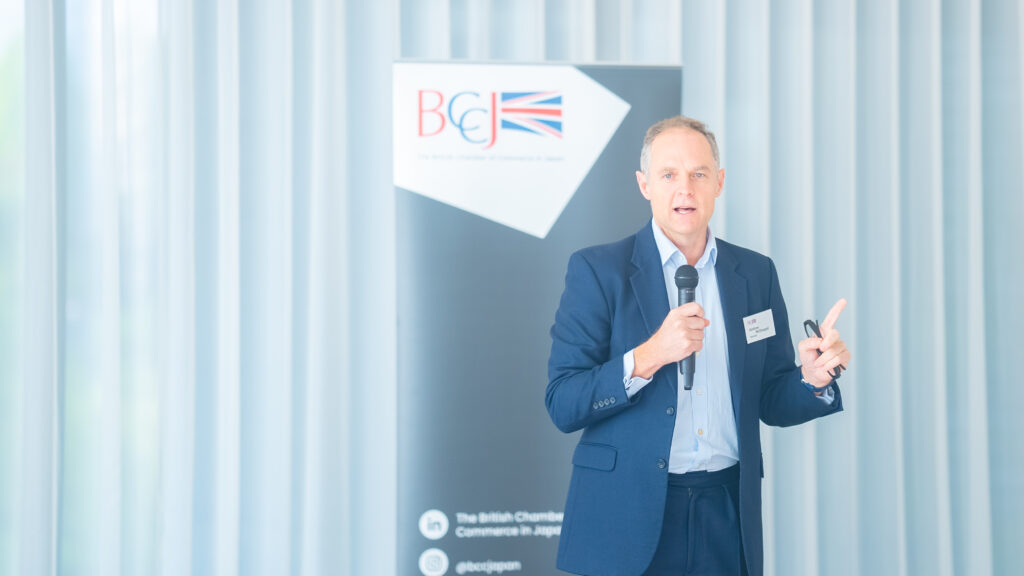Member? Please login
Two sides of the climate coin

Written by Sterling Content
November 12, 2021
Past Event Round Ups
With the world’s hopes pinned on greater global action on climate change at the 26th UN Climate Change Conference of the Parties (COP26) in Glasgow, the British Chamber of Commerce in Japan (BCCJ) hosted “Two Sides of The Climate Coin,” on October 28.
Addressing how to tackle the complex issues related to the global climate crisis, the webinar featured speaker Wai-Shin Chan, Global Head of HSBC Climate Change Centre of Excellence and ESG Research, and was moderated by Heather McLeish, Director, EY Japan, and member of the BCCJ’s Responsible Business Taskforce.
In August 2021, UN Secretary-General Antonio Guterres declared a “code red for humanity,” noting that the internationally agreed threshold of 1.5˚C above pre-industrial levels of global heating was “perilously close.”
Mobilising private and public finance is seen as crucial for governments to achieve the ambitious emission reduction targets suggested by COP26 President Alok Sharma. UN Special Envoy on Climate Action Mark Carney has estimated $100trn (£74trn) will be required over the next three decades to decarbonise.
Achieving net zero
Chan told attendees of the BCCJ’s webinar that COP26 is more important than ever as the last two rounds of talks, plus a year’s delay due to the pandemic, left a lot of outstanding issues. COP26 “is about tying up the loose ends from the operational guidelines of the Paris Agreement, also known as the Paris Rulebook,” he explained, adding that these tasks were set to be completed in 2018, at COP24 in Katowice, Poland.
“The whole idea is we need to be on a net zero trajectory by 2030. And it’s very worrying as the UN keeps issuing these reports … which show we’re well below where we should be. We should be heading towards 45% emissions reduction by 2030, but we’re at about 7, 8 or 9%, and that’s something we need to be working on. So it’s the last chance to get on this net zero trajectory.”
Given recent headlines and the obvious danger to humanity without climate action, McLeish asked Chan why the world is yet to achieve the necessary emissions reductions.
“Essentially we need a complete paradigm shift in the way we live: a fundamental shift in the economy, power, transport and industry, how we live in our buildings and cities and how we sustain our livelihoods,” he said. “These are big changes that are not easy or quick to implement. There is politics involved—a lot of inertia from old traditional industries that may be higher carbon, so a lot of inertia to change, but a lot of urgency given we’re already seeing the impacts of climate change worldwide in all the extreme events, such as storms, droughts and floods.”
Chan also expressed concern, particularly in the longer term, in desertification, biodiversity loss, deforestation and rising sea levels.
The technologies to make the transition to a net zero future exist, he said, but the investments need to be made now, to ensure “we don’t fall back on old, high carbon-emitting technologies.”
COP26 expectations
Asked his expectations for COP26, Chan said he is hoping the technical details of Article 6 of the Paris Agreement will be mapped out. These concern the carbon trading and pricing and mitigation.
“It’s about ensuring that the emissions reductions you make through carbon credits are lowering atmospheric concentrations of CO2—a true reduction,” he said.
“On finance, it’s about how developed economies can convince developing economies they will come good on their promise of $100bn [£75bn] a year [in climate finance]. We almost got there at $80bn [£60bn], but was that for mitigation or adaptation? Most was mitigation but adaptation is very important for developing economies.”
He added that he would watch for pledges by countries such as Brazil and India on emissions reductions, and pointed to the importance of adaptation as well as emissions mitigation.
“Mitigation gets more attention. If you reduce your emissions, that has a global impact. But if I make my local bridge stronger and able to withstand a one-in-100-year storm, only the people using that bridge benefit, so the impacts are less visible,” he said. “So historically there’s been a greater focus on mitigation than adaptation. It’s very important to certain economies, especially emerging markets.”
It is also important to ensure accurate verification of emissions reduction, he added: “If we give you a carbon credit for your forest, how do we know the forest will be there in 100 years’ time, which is how long the CO2 will be in the atmosphere, and not succumb to a wildfire or insect infestation?”. There are lots of questions around verification … so they need to go to credible verifiers, to make sure it’s truly beneficial to climate.”
Chan urged policymakers, companies and investors to act, even if such measures could prove economically harmful in the short term.
“It’s about focusing on the long term. The structural changes in the economy may cause short-term deflation, or a lowering of gains and GDP but, in the long term, the improved infrastructure, systems and business model changes will hopefully mean you’ll have greater growth,” he said. “Investors are moving along on their ESG journey and, with more information available, there’s a broader realisation over the long term that companies that take action will do better.”







